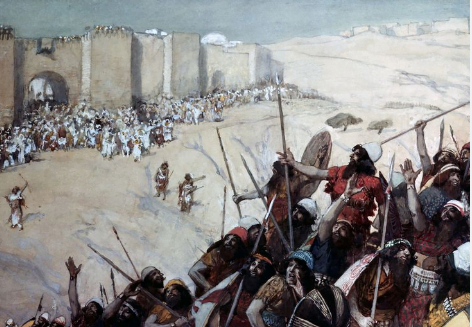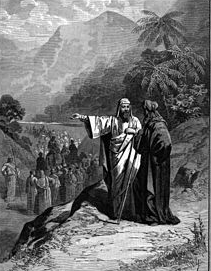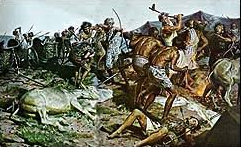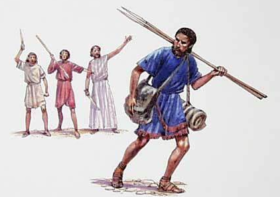Birth Of Warfare In The Biblical Text

Genesis 14, of the Hebrew Bible, presents an account which narrates the birth of warfare in the Biblical text. This account represents the first acknowledged instance of war in the Bible. The backdrop for the beginning of armed conflict in the Bible is formed on the relationship of two central characters, Abram and Lot, who make their decision regarding how they are to live out their lives and forge their legacies in the world. Both men, Lot and Abram his uncle, coalesced together after the death of their respective fathers, Haran and Terah, under the urging of Yehovah, have departed their homeland in Ur, and are now poised upon the precipice of the Promised Land.
Having established themselves in this new land, Abram and Lot discover that attaining affluence brings about its own set of relational difficulties. The struggle for enough land to sustain their growing abundance presents a problem which causes the two families to strive against one another. Therefore, to avoid conflict between brothers, they decide to separate. Abram gives Lot the option to select first which area he desires for his family to settle; he chooses what appears to be the most fertile region and departs to the east, leaving Abram in the Promised Land. Lot’s move to the east is significant as we recall that it was to the east, in Babylon, that the people were scattered after they decided to build a tower through which they would forge their own destiny. Lot, with his move toward the east, threw his lot in with those people who, through their own agency, and without Yehovah, would determine a place and posterity for themselves.

This fertile land to the east where Lot settled was under the auspices of five hegemonic kings, Bera king of Sodom, Birsha king of Gomorrah, Shinab king of Admah, Shemeber king of Zeboiim, and the king of Bela or Zoar. Yet, these five kingdoms were positioned in a weakened estate, having for twelve years paid tribute to Chedorlaomer king of Elam who commanded three other northern kings, Amraphel king of Shinar, Arioch king of Ellasar, and Tidal king of nations. Mustering up their courage the five kings of the southeast rebelled in the thirteenth year and refused to pay tribute to the northern king any longer. This arrangement, of course, as with any country harboring imperialistic intentions, did not sit well with the northern kingdoms. Nevertheless, the entire scenario was simply a setup for providence to step in; and divine providence has a way of turning the intentions of men into the designs of Yehovah.
As a result of Lot’s greedy desire for the visibly best land, he found himself situationally aligned on the wrong side of history. For in the fourteenth year, after the southern kings’ rebellion, King Chedorlaomer led his coalition comprising the armies of four kings into the south routing many tribes of the region. And when the king of Sodom with his allies joined the battle, they were also put to flight. The battle grew so hotly in disfavor against the five kings that in their attempt to flee, many of them, as they were pursued, fell, and perished in the slime pits of the vale of Siddim. The four armies under Chedorlaomer took all the goods, the spoils of war, along with Lot and his family, and departed for their own land.
Upon hearing of the misadventure of his nephew, Lot, Abram did not become smug or sanctimonious; on the contrary, he exhibited concern and compassion for his plight. That compassion was demonstrated through love in action. He gathered his paltry three hundred- and eighteen-men servants along with the brothers three, Eshcol, Aner, and Mamre, Amorite residents of the plain, and pursued the victorious armies to Dan. There Abram deployed a surprising flanking strategy by night which thoroughly discomfited their ranks. Subsequently, Abram pursued them almost two hundred miles to Hobah, and recovered all the goods, women, and Lot and his family.

Abram returned to Sodom victorious after the first biblically recorded war where he was met by Melchizedek, king, and priest of Salem. It is well worth noting that Abram paid tithes to Melchizedek in recognition that he was the representative of the most high God of heaven and earth. Through this act, Abram was giving reverence to the fact that it was only through the divine providence of Yehovah that he was able to pursue, defeat and recover all from the enemy. In this birth of warfare in the biblical text, there was a man who first trusted Yehovah in His providence to give the victory.




Leave a Reply